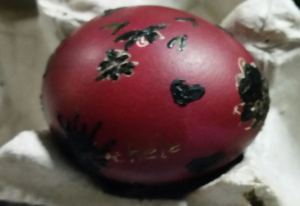Michele Huey's Blog: God, Me, and a Cup of Tea, page 51
March 13, 2016
Between Panic and Paradise
What is faith? It is the confident assurance that something we want is going to happen. It is the certainty that what we hope for is waiting for us, even though we cannot see it up ahead. —Hebrews 11:1 (TLB)
On State Route 119 between Big Run and DuBois stands an interesting and somewhat amusing highway sign, giving the direction and mileage to some area towns: Panic, Desire, and Paradise. Yes, those are real names of real towns here in western Pennsylvania.
 When a picture of this sign appeared on Facebook last week, my comment was, “Pity the poor folks who have to say they live between Panic and Paradise. . . . Wait . . . . That would be all of us.”
When a picture of this sign appeared on Facebook last week, my comment was, “Pity the poor folks who have to say they live between Panic and Paradise. . . . Wait . . . . That would be all of us.”
On our journey from the womb to the tomb, much like the ancient Israelites’ 40-year trek through the wilderness, we travel through various states of panic and desire (and so much more in between) to get to our Promised Land. We learn the rules of survival along the way—one of which, and the most important, is to carry a survival kit.
Included in this survival kit are four essential items.
First is a vision of your destination—Paradise, or Heaven, God’s home. In this goal-setting society in which we live, we’re advised to post a picture of what it is we want to achieve someplace where we’ll see it everyday. When my husband and I were still building our house—a 30-year-project—I taped picture of a log home inside a kitchen cupboard door. Keeping what we want in sight daily reaffirms the belief that we will eventually get there and helps us to trudge through the rough spots. Read Revelation 21 and 22 often to keep the vision of your destination fresh.
Another vital item your survival kit should carry is faith, which will fuel your faltering steps. As Corrie Ten Boom once said, “Faith is like radar that sees through the fog.” As defined by God’s Word, “Faith is being sure of what we hope for and certain of what we do not see” (Hebrews 11:1).
The third item is a map to guide you along the way. You already know the route: Jesus Road, for He said, “I am the way. . . . No one comes to the Father (and His home) except through Me” (John 14:6). But we can get confused when darkness descends, as it always will. God’s Word, as phrased in The Message, will “throw a beam of light” on the darkened path (Psalm 119:105).
The last item is identification. Even when I’m hiking, I carry my driver’s license in a pocket. Identification is proof that we are who we say we are. When you travel to a foreign country, you need proof of citizenship. On our journey to Paradise, we carry the citizenship papers Jesus provided—proof that we are citizens of Heaven (Philippians 3:20). We don’t belong to the world we’re traveling through. Like the heroes of faith listed in Hebrews 11, we’re “aliens and strangers on earth” (Hebrews 11:13).
As you travel from Panic to Paradise, clutching your survival kit, remember you don’t walk alone, for the King of your destination is travelling with you. (See Exodus 33:14; Hebrews 13:5; Matthew 28:20 ).
As I trek through the wilderness of this world, Lord, remind me to use my survival kit. Amen.
Extra tea: Read and meditate on Hebrews 11


March 6, 2016
A Story of Renewal

Rose Hill Mansion, Hilton Head Island, SC
Therefore, if anyone is in Christ, he is a new creation; old things have passed away; behold, all things have become new. —2 Corinthians 5:17 (NKJV)
One of the places we visited while on our week-long getaway to Hilton Head Island last month was Rose Hill Mansion.
Now, I realize all these Southern plantations come with a history, but Rose Hill’s fascinated me.
Construction on the mansion began in the 1850s as a wedding present from a wealthy physician and planter and his wife to their daughter. When the Civil War broke out, work came to a standstill. How the place was spared from being burned to the ground by Union soldiers is still somewhat of a mystery. One story is that its structure resembled a church, and the enemy couldn’t bring themselves to destroy such a beautiful building.
After the Civil War, the property changed hands a number of times, and work on the interior wasn’t completed until 1946, when its new owners “finished it in grand style”—nearly 100 years after construction first began. For many of those years, though, the house stood empty.
In 1987 a devastating fire destroyed much of the mansion. For nearly a decade it sat—alone, abandoned, desolate, defenseless against heat and cold, sun and storm—until 1996, when a young couple visited the house and saw beyond the ruins. They purchased the property and began a decade-long restoration of the mansion. They worked hard to restore it to its former glory and use as much of the original designs and materials as they could. Today they live in the restored mansion, and tours are given daily, although only the ground floors.
The history of that mansion could be each of our personal histories. We, too, start out with lofty dreams and high hopes. God has a unique blueprint drawn for each of us. His plans are grand.
Then life interrupts. Perhaps we rebel against the God who created us with such love and promise and decide we want to follow our own blueprint and not the Master Builder’s. Perhaps life beats us down, and we’re left a burned-out shell of what could have been. Our faith has been shattered, our hopes dried up, our dreams reduced to rubble, exposed to the merciless elements of the world.
Then someone comes along who sees beyond the devastation, who sees potential in the ruins. And offers us something we never thought possible: renewal.
Actually, that Someone was there all along. We just didn’t see Him. We didn’t recognize Him. Pain and bitterness blind us to the good things that remain.
And He doesn’t just offer restoration. You see, to restore something is to return it to its former condition.
God doesn’t want to restore us to our former condition, no matter how good we think it was. No, He wants to make us new. Brand new. With a new beginning, a new heart, a new mind, a new perspective, a new attitude.
Springtime is the time nature renews itself. Notice I didn’t say “restore.” You see, all the leaves and flowers and vegetation that died last fall don’t return. New leaves and flowers sprout.
So it is with each one who says yes to God: “When someone becomes a Christian, he becomes a brand new person inside. He is not the same anymore. A new life has begun!” (2 Corinthians 5:17 TLB)
Father, thank You that we don’t have to sit alone, abandoned, desolate, without hope. Thank You for sending Your Son to give us new life. Amen.
Extra tea: Read and meditate on John 3:1–21
NOTE: For more of Rose Hill Mansion’s history (and some fascinating photos), visit their website at www.rosehillmansion.com
HAVE YOU SUBSCRIBED YET?
Beginning with the Spring 2016 newsletter, I’ll be giving away a $15 Amazon gift card to one newsletter subscriber, whose name will be announced in the newsletter.
In addition, I’ll be offering exclusive material and occasional giveaways to subscribers only.
Have you subscribed yet? If not, you can sign up for the newsletter by clicking HERE.


February 28, 2016
Lesson from the Leathernecks

Dean at the entrance of the Marine Corps base where he underwent basic training in 1968-1969
Let love and faithfulness never leave you; bind them around your neck, write them on the tablet of your heart. —Proverbs 3:3 (NIV)
One of the high points of our trip to South Carolina earlier this month was a visit to Parris Island. Forty-seven years ago my husband, Dean, underwent U.S. Marine Corps basic training there.
We spent hours taking in the exhibits in the museum, especially the ones pertaining the Vietnam War era, during which Dean served. I got a glimpse into a time period of my husband’s life that helped to mold him into the man he is today. One exhibit especially was meaningful—the ejection seat and canopy of an F-4 Phantom, the jet Dean worked on as an aircraft electrician.

Dean explains how the canopy and ejection seat worked.
The “Core Values” display particularly intrigued me—mostly because it seems in today’s society “core values” seems to be a hot button topic. I learned that the Marine Corps incorporates Core Values in its training of recruits: “From the first contact with a recruit, through the physical, mental, and moral challenges of recruit training, to the final dismissal,” reads the display, “the transformation from an individual to a Marine who is committed to our Core Values and service to our country begins here (basic training).”

I love this banner over an intersection on the base.
There are three Core Values: Honor, Courage, and Commitment.
Honor, as defined by the USMC, is “the quality that guides Marines to never lie, cheat, or steal; to abide by an uncompromising code of integrity; to respect human dignity; and to have concern and respect for each other.”
Courage is “the mental, moral, and physical strength ingrained in Marines to carry them through the challenges of combat and the mastery of fear; to do what is right; to adhere to a higher standard of personal conduct; to lead by example, and to make tough decisions under stress and pressure.”
Commitment, the final Core Value, is “the spirit of determination and dedication . . . that leads to the highest order of discipline for unit and self; it is the ingredient that enables 24-hour-a-day dedication to Corps and country; pride; concern for others; and unrelenting determination to achieve a standard of excellence in every endeavor.”
Add to that the Marine Corps motto, Semper Fi (Semper Fidelis), meaning “always faithful, always loyal,” being true (devoted) to God, family, friends, duty, country.

Dean reflects on his experience as a U. S. Marine.
Honor, courage, commitment, faithfulness, loyalty—traits God, too, wants us to consciously develop in our character and in our children (see Deuteronomy 11:18–20).
These traits guide us, provide a foundation for right living, and make us better people. We admire them in our heroes. They are qualities we should look for in the candidates as we go to the polls.
Just think: What would our community be like if everyone adhered to these Core Values? Our society? Our country? Our world?
Former President Ronald Reagan once said, “Some people spend an entire lifetime wondering if they made a difference. The Marines don’t have that problem.”
Neither should the child of God.
Father, help me to work with You as You develop these qualities in me. May I be a living example of a true Christian. Amen.
Extra tea: Read and meditate on Psalm 1
To view a few more pictures of our trip (I plan to add more), click here.
Exciting news for newsletter subscribers:
Beginning with the Spring 2016 newsletter, I’ll be giving away a $15 Amazon gift card to one newsletter subscriber, whose name will be announced in the newsletter.
In addition, I’ll be offering exclusive material and occasional giveaways to subscribers only.
Have you subscribed yet? If not, you can sign up for the newsletter by clicking HERE.


February 21, 2016
In Over My Head
Call to Me and I will answer you . . . —Jeremiah 33:3 NKJV
“I’m in way over my head,” I told my husband when I phoned him to let him know what time I’d be home.
I’d signed up for a Pysanky egg decorating workshop, knowing full well the extent of my artistic abilities is drawing stick figures and happy faces—in pencil on paper.
So why was I sitting at a table with a burning candle in front of me, a soot-blackened kiska in my hand, trying to draw a flower with wax on an egg?
What was I thinking?
That it would be fun? No. I know too well the frustration and misery of trying to do something I am totally inept at doing.
For the social aspect? Nah . . . homebody that I am, I’d rather have been at home reading, working on a jigsaw puzzle, taking my turn in my electronic Scrabble games, or watching NCIS reruns.
For the challenge? Nope. I can think of more satisfying challenges to take on.
Perhaps it was the little Slovak girl in me—my roots calling to me to learn something about my heritage.
Pysanka, you see, is an egg decorated using wax to draw intricate motifs and designs on the shell at various dyeing stages. The art form dates back to early Slavic cultures.
To me dyeing Easter eggs meant plopping hard-boiled eggs into a glass of dye mixture. With the kit came wax pencils, but the most I ever did with that was scribble my name. And even that looked pathetic. Best just to dye the eggs.
Now in my sixties, I’m finding more and more meaning in my heritage. (Remember the Thanksgiving Day Cemetery Run?) So I signed up. And showed up. And almost gave up.
But help came from many sources—the workshop leader, who gave me ideas for designs at each stage, told me what to do for the next phase, and didn’t laugh at my flower; the two ladies at my table, who patiently showed me how to use the kiska (wax pen) and reassured me my egg would turn out fine; and the more experienced ladies whose intricate designs, rather than intimidate me, awed me and inspired me.
In life, too, we occasionally find ourselves in situations over our heads. Sometimes it’s by our own doing; sometimes it comes under the “life happens” category. How do you respond?
What did Peter do when he found himself in over his head? He cried out for help: “Lord, save me!” And immediately Jesus reached out and caught him (Matthew 14:30–31).
We, too, have the same source of help that Peter had, but too often we’re too proud to ask.
It’s no shame to ask for help—whether from God or from others. Indeed, our heavenly Father puts folks in our lives who can help, if we only ask.
My Pysanka won’t elicit any oohs and ahs, but, with the help of others, I finished it.
Why, I’m even thinking of designs for next year’s egg.
Thank you, Father, for sending me help—even when I don’t ask for it. Amen.

This is my Pysanka. Although I’m done decorating it and the dyeing stages are completed, the wax (black) will be melted off, the inside of the egg suctioned out, and a coat (or two) of varnish applied. Workshop leader (and Pysanky expert) Jeanne Curtis will complete these final phases.
Extra tea: Read and meditate on Matthew 14:22–33

Murder, money, and mayhem—just the formula for romance.
Romance writer Melody Harmon’s writing career is on the skids. Ex-cop-turned-suspense-writer Don Bridges isn’t doing much better. Then they team up and the story begins.
Available on AMAZON in Kindle ($2.99) and paperback ($13.49) formats. Click here to order from Amazon.
To order a personally autographed copy from me, click here. ($20 includes tax, postage, and handling.)
What readers are saying:
“I enjoy this author’s writing so I got this one as soon as it was released, and I was not disappointed. I was caught up in the lives of the characters and the story line from the first pages. The book is a wonderful combination of faith, mystery and romance, and there are twists and turns in the story that kept me reading to see what was going to happen next. I certainly would recommend this book to any reader who enjoys good Christian fiction. I definitely will be watching for the second book in the series. ” – Ann Ellison
“A mystery with a twist or romance – or the other way around.” – Roberta Updegraff


February 14, 2016
Forty Days
 Examine yourselves, to see whether you are holding to your faith. Test yourselves. Do you not realize that Jesus Christ is in you? – 2 Corinthians 13:5 (RSV)
Examine yourselves, to see whether you are holding to your faith. Test yourselves. Do you not realize that Jesus Christ is in you? – 2 Corinthians 13:5 (RSV)
Ever notice how the number 40 occurs at critical moments in Scripture? It rained on the earth for 40 days and 40 nights. It was the number of days required to properly embalm a body for burial in ancient Egypt.
Moses, especially, is linked to the number. Not only did he lead the stubborn Israelites in the wilderness for 40 years, but his life is divided into three 40-year periods: his Egyptian years, his shepherd years, and his wilderness years. He spent 40 days and 40 nights on Mount Sinai being personally tutored by God Himself in the law.
The Israelite spies cased the Promised Land for 40 days. Goliath defied God for 40 days. Elijah fasted in the desert for 40 days. Jonah told the Ninevites they had 40 days to get their act together before God would judge them.
Prior to beginning his earthly ministry, Jesus fasted and prayed in the wilderness for 40 days and 40 nights. And His final 40 days on earth between His resurrection and ascension were spent giving last-minute instructions to His disciples.
Notice how the number is associated with judgment and preparation. Lent, the 40 weekdays from Ash Wednesday to Easter Sunday commemorating Jesus’ fasting in the wilderness, is a time of self-examination and spiritual preparation. We give up things, such as eating candy and pop or watching television, to practice self-denial and self-discipline.
But the most important part of this time should be examining our hearts, minds and spirits, asking God to show us anything we harbor that hinders us in our spiritual growth.
First, examine your heart, the seat of our emotions and true character: Are your motives right? Do you choose love over hate, forgiveness over resentment, self-control over anger, contentment over envy, generosity over selfishness, faith over fear, humility over pride, hope over discouragement, trust over doubt, patience over impatience, thankfulness over complaining?
Next examine your mind: Are you allowing God to transform and renew your mind? Or are you still hanging onto control of your thoughts, especially the bad ones? Are you capturing every thought and giving it to God? Are you filling your mind with the positive or the negative? Use Philippians 4:8 as your report card.
Now for the soul and spirit. According to the Children’s Ministry Resource Bible, my soul is the part of me that responds to the world, while my spirit is the part of me that responds to God. I am not to love the world or the things of the world (1 John 2:15). Instead I am to fix my eyes on Jesus (Hebrews 12:2) and use Him as my model. Am I still running from Him, a rebel with my own agenda, and making myself miserable? Or am I running to Him, needing His love, forgiveness, strength and wisdom as desperately as I need air? Do I allow Him to guide my footsteps, day by day, moment by moment, or do I insist that I do it my way?
Some pretty hard questions, but ones that God will help us with if only we ask.
Search me, O God, and know my heart. Try me, and know my thoughts; and see it there be any wicked way in me. And lead me in the way everlasting. (Psalm 139:23-34). Amen.
Extra tea: Read and meditate on Matthew 4:1–11
ARE YOU LOOKING FOR A DYNAMIC, INSPIRATIONAL SPEAKER FOR YOUR EVENT?
Check out my SPEAKER PAGE for some topics I speak on. There are more — much more. I’ll develop a topic for your theme. I also do retreats. Contact me at michelehuey@hughes.net for more information.


February 7, 2016
To the Hilt
 “I have come that they may have life, and have it to the full.” —Jesus, as quoted in John 10:10 (NIV)
“I have come that they may have life, and have it to the full.” —Jesus, as quoted in John 10:10 (NIV)
“Wherever you are, be all there. Live to the hilt every situation you believe to be the will of God.” —Jim Elliott
When I read this quote by the late missionary Jim Elliott, it made me think: What does it mean to “live to the hilt”?
The hilt, the handle of a sword, is the only part visible when the blade is plunged in all the way. “To the hilt,” then, means giving something your all—one hundred percent, no reserve.
To me, living to the hilt means three things.
First, living to the hilt means exploring every God-given dream and pursuing the vision.
When I was in high school, I dreamed of becoming a writer. My life’s path led to teaching, which still remains a passion of mine, but the dream of writing never died. Twenty-three years after I graduated from college, I published my first pieces—a couple of devotionals in The Upper Room and a personal experience story in Guideposts. Recently I published my third novel.
The road hasn’t been easy. The learning curve can be steep, and it’s ongoing. When you reach one level, you find there’s another to master.
But when God gives you a dream, you must work to make it a reality. What you are is God’s gift to you. What you make of yourself is your gift to God. Remember the parable of the talents? Only the two who used what they were given received the commendation of “Well done, good and faithful servant!”
So discover, develop, and dispense your God-given gifts. Pursue the vision.
Second, living life to the hilt means doing—giving—your best, every moment, every breath. “Whatever your hand finds to do, do it with all your might” (Ecclesiastes 9:10). “Whatever you do, work at it with all your heart” (Colossians 3:23).
ALL your might. ALL your heart. Nothing held back.
And don’t let fear hold you back. Fear doesn’t come from God. What Paul wrote to the young pastor Timothy is still true today: “God has not given you a spirit of fear or timidity, but of power, love, and self-discipline (2 Timothy 1:7). He has filled you with His Holy Spirit. Remember, God is for you—He’s your biggest cheerleader. And if God is for you, then who or what can succeed against you? (Romans 8:31)
So, go on, give it your best shot. Give it your ALL.
Third, living to the hilt means looking forward, not back.
Too often, we play the “if only” game, weaving a web of regret—and getting tangled in it. Don’t waste time and expend energy on what could have been. Use the past to build the future. Learn from your mistakes and move on.
So what if things didn’t turn out the way you planned—the way you wanted? God, ultimately, is in control. He knows what He’s doing. Forget what’s behind and reach forward to what’s ahead. Press on toward your God-given goal (Philippians 3:13–14).
Jesus came to give us life in all its fullness. That means living full, living abundantly, living to the hilt.
Remember the words of Abraham Lincoln: “In the end, it’s not the years in your life that count. It’s the life in your years.”
Thank You, God, for giving me a dream and showing me the way to make it come true. Amen.
Extra tea: Read and meditate on Matthew 25:14–30


January 31, 2016
Pencils, Pens, and UNDO Buttons

I will call to you whenever I’m in trouble, and you will answer me. – Psalm 86:7 (NLT)
“Come now, let’s settle this,” says the Lord. “Though your sins are like scarlet, I will make them as white as snow.” – Isaiah 1:18 (NLT)
When I first started writing as a profession, I kept my accounting records in a green ledger. I kept things simple with two sections: cash in and cash out. I used a pencil and painstakingly added the columns with a calculator.
Then I got a computer and discovered Excel, which automatically does the math—and fell in love. How much simpler and easier bookkeeping became—although it still isn’t very high on my “things I like to do” list. I’m a writer; therefore, words, not numbers, are my forte. But bookkeeping is mandatory in business, and I can’t afford to hire someone to do it for me.
So when I make a mistake—and I make lots of them—I thank the good Lord for the UNDO button.
This morning while bringing my bookwork up-to-date, I accidentally pasted a large section of bookwork in a place it wasn’t supposed to go, thereby copying over (and deleting) some important information.
OOPS!
(Timeout for a little FYI for those of you who aren’t familiar with computers: I can “copy” a section of a document on a virtual clipboard, then “paste” it anywhere I want with just a few strokes on the keyboard and a couple of mouse clicks.)
Not to worry, though. All I had to do was click on the UNDO button (either a curved arrow on top of the document or a menu option under the EDIT tab), and voila! The mistake was corrected. I didn’t lose all that documentation.
Remember grade school? We used pencils so we could easily erase our mistakes, and we made sure we had another eraser besides the one on the pencil. Mistakes are to be expected when you’re learning.
Then somewhere along the line, we graduated to pens. Then a mistake meant you tossed the paper in the trash and started all over again. Talk about pressure! It almost seemed as though we now were expected to make no mistakes.
But mistakes can’t be avoided. We’re flawed, imperfect human beings, so we err more than we’d like to admit.
And sometimes our mistakes land us in a mess only God can undo.
Remember Jacob? His mistakes, brought on by his conniving, deceitful nature, led to a flight for his life. But God met him in the midst of his mistakes and assured him that all would be well (Genesis 28:15).
Remember Israel? The nation made a real mess of things when they consistently disobeyed God. Yet, once again, human mistakes met with God’s mercy:
“This I recall to my mind, Therefore I have hope. Through the Lord’s mercies we are not consumed, Because His compassions fail not. They are new every morning” (Lamentations 3:21–23 NKJV).
Our heavenly Father meets us in our mistakes, too. He is the ultimate UNDO button.
Thank you, Father, that Your mercy meets with my messes at the intersection of the cross. Amen.
Extra tea: Read and meditate on Genesis 27:41; 28:10–22


January 28, 2016
Goodreads Giveaway
I’m giving away one autographed paperback copy of Getaway Mountain on Goodreads. If you’d like to enter the giveaway, click on the link below. Please pass this along to whomever you think may be interested in the new romantic suspense, Book 1 in the PennWoods Mystery series.
on the link below. Please pass this along to whomever you think may be interested in the new romantic suspense, Book 1 in the PennWoods Mystery series.
Giveaway ends February 14.
Thank you!
Click here to enter the giveaway.


January 24, 2016
Terrible or Terrific?
And be renewed in the spirit of your mind. – Ephesians 4:23 (NKJV)
What a morning! It was cold, cold, cold!
So I stayed in my warm, cozy bed until 8, then got up and got busy. I usually make the bed, set up my writing room for the day, make my tea, feed the cats, put in a load of laundry, add a log or two to the fire in the wood stove, and get dressed before I have breakfast.
I say my prayers before I get put of bed because once my feet hit the floor, my brain lasers in on my ambitious to-do list for the day. As you can see in the previous paragraph.
On my way to the kitchen that frigid Tuesday morning, I stepped in cat puke. Ever try to clean smashed, regurgitated cat food out of a braided rug and from the treads of your favorite slippers? Which in my case were my comfy, wear-all-day-every-day moccasins.
My mind was already labeling the day “Terrible Tuesday,” and the day had barely started. What I needed to combat the stinkin’ thinkin’ was a good, positive, encouraging quote from the file of inspirational quotes I collect on my computer.
I found the perfect one: “No matter how you feel, get up, dress up, show up, and never give up!” (Zig Ziglar)
I determined it was not going to be “Terrible Tuesday” but “Terrific Tuesday.”
It was a good thing I nipped that negative attitude in the bud because I could have had a real good pity party later on when the UPS man delivered only one box of three containing my newly released novel. When I checked the tracking numbers of the two missing boxes, there was no record of them. With a list of book orders from folks who were patiently waiting for the novel to be released, I could easily have defaulted to panic mode.
But I knew God knew where those AWOL boxes were, so I asked Him to please send them on their way. Soon.
Every time I thought about it, I just shot a few words up to heaven. Sometimes only one—“please.”
Life is full of setbacks, disappointments, and plans gone awry. We choose how we’re going to deal with them.
“ALWAYS be joyful,” the Apostle Paul advises in 1 Thessalonians 5:16–18. Not only when things go your way. Even when—especially when—they don’t.
“NEVER stop praying.” You don’t have to resort to long, repetitious prayers. In fact, Jesus said not to (Matthew 6:7). There have been times my prayer was simply a whispered, “Oh, Lord.” Our heavenly Father knows what we need before we even ask (Matthew 6:8).
“Be thankful in ALL circumstances.” Not only when the whole order shows up. Not only when things go according to plan. Even when—again, especially when—you don’t feel thankful.
“Be thankful IN all circumstances—not “for” all circumstances. Be like Paul, who “learned to be content whatever the circumstances” (Philippians 4:11).
The two missing boxes arrived on Thursday. The rug is clean (but not the moccasins only because I figured dry vomit would be easier to clean out of the treads, and I haven’t gotten back to it yet).
The next time you’re tempted to think “terrible,” stop, change gears, and think “terrific” instead.
You’ll be surprised how good life could be.
The next time I’m tempted to think “terrible,” stop me, Lord. Help me to focus on the “terrific.” Amen.
Extra tea: Read and meditate on 1 Thessalonians 5:16–18
 Getaway Mountain, Book 1 in the PennWoods Mystery series is available on Amazon for your Kindle and as paperback.
Getaway Mountain, Book 1 in the PennWoods Mystery series is available on Amazon for your Kindle and as paperback.
Personally autographed copies may be ordered for $20 (tax and shipping included) by emailing michelehueybooks@gmail.com or by clicking on the CONTACT tab above.
Thank you for being such faithful, encouraging readers!
Blessings,
Michele


January 17, 2016
Sitting on the Sidelines

SONY DSC
Everyone should be quick to listen, slow to speak and slow to become angry. – James 1:19 (NIV)
When our youngest son played baseball, I learned a lot about sitting on the sidelines and watching my child struggle—knowing, outside of cheering encouragement from the stands, there was nothing I could do to help him.
That’s hard for a parent. We want to help our children any way we can. We want to fix what’s broken in their lives, kiss the boo-boos, take away the hurt—and we’ll move heaven and earth to accomplish it.
When they’re little and still living at home, we can do that. Then they grow up, and learning to be a (good) parent moves up to another level. A whole new set of skills waits to be learned, new behaviors to be adapted, if we want to maintain a healthy, thriving relationship with them and continue to influence them in a positive way.
Watching our son struggle on the mound during his baseball years was but a prelude to watching a grownup child grapple with the curve balls of life. What’s a parent to do?
What the apostle James wrote in the first-century is excellent parenting advice in the twenty-first.
First, be quick to listen. Be a good listener. That means listen with your ears and with your heart. Listen without judging. Listen without trying to come up with an answer, a solution. Just let them talk. Listen without thinking of your demanding to-do list. Thank God your child wants to confide in you. Be a careful, thoughtful listener (Amplified version of James 1:19).
Second, be slow to speak. The writer of Ecclesiastes gives good advice when he advises, “Do not be quick with your mouth. Do not be hasty in your heart . . . let your words be few” (Ecclesiastes 5:2). Pray for wisdom before you speak. Don’t give advice unless asked for it, and when you do, let your words be few. Be “a speaker of carefully chosen words” (Amplified). Ask questions to help them figure it out for themselves, see things that they don’t see, understand things a little bit better. “Let everything you say be good and helpful, so that your words will be an encouragement to those who hear them” (Ephesians 4:29).
Third, be slow to become angry. Keeping emotions in check is difficult when your child is hurt ing. The Mama Bear is roaring at her cage doors. You’ve got to keep her locked up. Know when to intervene and how. Be patient, reflective, forgiving (Amplified). Sometimes—most times—you don’t know when or how to intervene—or even if you should. That’s where prayer comes in. Ask God for His wisdom: “If any of you lacks wisdom, he should ask God, who gives generously to all without finding fault, and it will be given to him” (James 1:5).
ing. The Mama Bear is roaring at her cage doors. You’ve got to keep her locked up. Know when to intervene and how. Be patient, reflective, forgiving (Amplified). Sometimes—most times—you don’t know when or how to intervene—or even if you should. That’s where prayer comes in. Ask God for His wisdom: “If any of you lacks wisdom, he should ask God, who gives generously to all without finding fault, and it will be given to him” (James 1:5).
And finally, love unconditionally. Our children respond to our love more than to our words. Read 1 Corinthians 13 over and over. Model that kind of love, and keep the doors open and the coffee pot ready.
Being a parent doesn’t come with an expiration date—it’s a lifetime commitment. Being a good parent means you never stop learning how.
With the grace of God, the wisdom of His Word, and persistant prayer, I can be the parent my child needs, even when—especially when—I’m sitting on the sidelines.
Help me, Lord, to be quick to listen, slow to speak, and slow to become angry when I’m on the sidelines watching my children struggle with life. Amen.
Extra tea: Read and meditate on James 3:17–18
What you’ve been waiting for!

Murder, money & mayhem – just the formula for romance.
Her writing career is on the skids. His isn’t much better. Then they team up and the story begins. Getaway Mountain, Book 1 in the PennWoods Mystery series, is now available on Amazon.
Click here to get your copy.


God, Me, and a Cup of Tea
- Michele Huey's profile
- 19 followers






